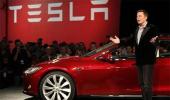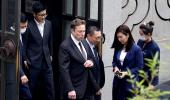India is sceptical that Tesla might import into the country cars made in China.
Tesla executives were in India last month and appear to have proposed a factory in the country. But do not be surprised if that does not happen in a hurry.

The origin of the adage 'Revenge is a dish best served cold' is not quite clear, though some web sites attribute its first use to French author Eugene Sue.
Right now, though, the Chinese are having a field day with it. One of their weapons is a 12-year-old interview of Elon Musk.
As seen in a YouTube clip, Mr Musk is being interviewed on Bloomberg TV in November 2011. For the first 30 seconds of it, give or take, the Tesla chief laughs. In between the chuckles, he pauses long enough to say: 'Have you seen their car?'
Towards the end of that first half minute, the interviewer asks Mr Musk, 'You don't see them at all as competitor?'
Mr Musk, unhesitating as ever, says: 'No.'
The 'them' here is the Chinese carmaker BYD. Apparently, BYD stands for 'Build Your Dreams', words that adorn the rear of its models.
And a dream run it seems to be, not just for the company but also for swathes of Chinese people celebrating its surge.

The South China Morning Post newspaper, owned by China's Alibaba Group, did a four-part series on electric cars, the second of which opened with palpable glee by recounting Mr Musk's mirthful interview.
It went on to point out that BYD delivered 1.86 million fully electric and plug-in hybrid vehicles in 2022, 42 per cent more than Tesla's.
Plug-in hybrids have an electric motor powered by a battery, which needs to be plugged in for charging, as well as an internal combustion engine (ICE) running on gasoline.
They run on electric until the battery is fully depleted, when the ICE kicks in.
A report in Nikkei Asia says BYD is preparing to overtake Tesla in global sales of fully electric vehicles and is increasing its capacity.
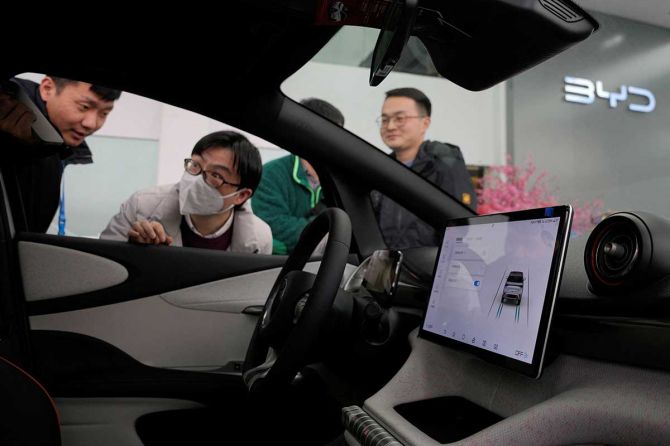
It is not just BYD; several Chinese electric carmakers are in the throes of not only zooming sales but also popularity.
A report by JD Power puts Tesla as only the 10th most desirable electric vehicle brand in China, behind natives such as BYD, Xpeng, Nio, and Li Auto.
These brands, as the South China Morning Post series pointed out, have successfully wooed Chinese buyers by making cars that cater to their tastes and needs -- be it digital cockpits, entertainment systems, or voice recognition tailored to Chinese accents -- unlike the global sensibilities of Tesla. They also provide long driving ranges.
Tesla has chosen to reduce its prices in China.

Tesla has been acting pricey in India, where there are just two significant indigenous makers of passenger cars and utility vehicles: Tata Motors and Mahindra and Mahindra.
The others are majority-owned by multinationals headquartered in other countries.
Tata Motors has taken an early lead in electric cars, but the numbers are not large. Of the 484,843 passenger vehicles Tata sold in 2022-2023 (it is a market leader in commercial vehicles), 38,322 were electric.
Not fair to compare these numbers with BYD's.
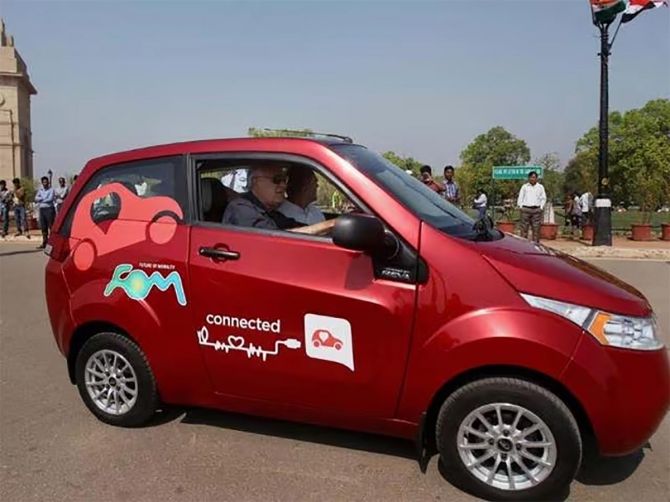
M&M had an early start in electric vehicles, but that beginning was all about a 10-seater three-wheeler creatively named Bijlee -- Hindi for electricity -- unveiled in 1999.
It later acquired Reva, which had once promised much with its tiny electric car, and relaunched a new avatar of the Reva in 2013 as e2O. (In case you have not noticed, Mahindra likes to give names to its cars that end with 'O'.)
It discontinued the e2O in 2019.
M&M re-entered electric vehicles last September with the launch of the XUV400 EV, but, as a Business Standard report pointed out last month, it is being seen as a 'filler' to mark the company's presence in the segment.
More is to come as M&M rolls out its comprehensive EV plan, which, in addition to passenger cars, includes three-wheelers and farm equipment.

Maruti Suzuki, for the longest time, appeared to be fixated on hybrid vehicles, much like its alliance partner, Toyota, from which it gets the Grand Vitara hybrid.
It tested an electric version of the WagonR, but abandoned the project because it did not meet cost and performance parameters.
This year, though, Maruti seems to have spurted into action, announcing as many as six EVs by 2030. But none of them is to go on sale before 2025.
There are some smaller EV numbers from the others: A few from the South Korean siblings, Hyundai and Kia, and some from MG Motor.
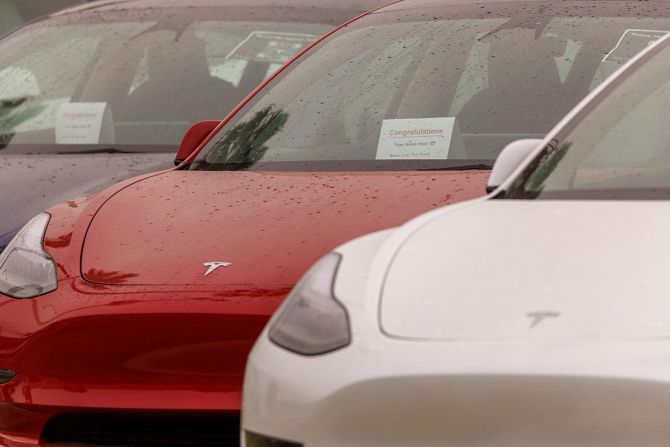
Why is Tesla in no rush in India
Long story short, the Indian EV market, for all its promise, is not going anywhere in a hurry.
At least, Tesla seems to have no fear of losing it to others. And that shows in the way it has been dragging its feet in the country.
In early April 2016, Tesla said it would bring its Model 3 to India, and started taking bookings for it. Things did not go according to plan.
Two years ago, Mr Musk registered a company in Bengaluru to import cars, talked about setting up company-owned retail showrooms, and urged the government to reduce the import duty to 40 per cent. The idea was to test the market first with imports.
The Indian government refused. The country charges as much as 100 per cent duty on import of cars in a certain price range, doubling their prices in the country.
Secondly, the government wants Tesla to manufacture in India.
Manufacturing in China came easily and early to Tesla. The Shanghai Gigafactory is its largest factory in the world by production volume, reportedly supplying more than half of all Teslas sold globally.
The whispers in the corridor say India is sceptical that Tesla might import into the country cars made in China.
Last month, Tesla executives were in India and appear to have proposed a factory in the country. But do not be surprised if that does not happen in a hurry.
Things would have been different if there was a greater fear of competition from, say, an Indian carmaker exhorting people to build their dreams.
Then, like China, a truly Indian carmaker could have had the last laugh, and savoured a cold dish.
Feature Presentation: Ashish Narsale/Rediff.com

